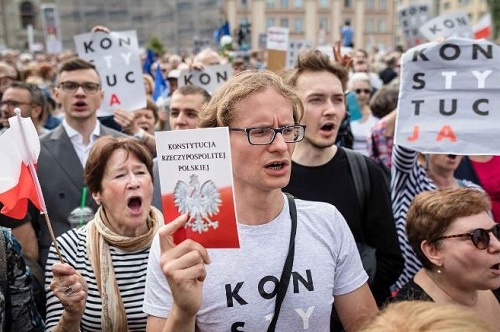AFP photo
By
Tom Arms
The proudly illiberal and populist government of Poland’s Law and Justice Party (PiS) has been threatening for some time to effectively end the concept of an independent judiciary.
They were told by the EU that if they did so they could face Brussels-imposed sanctions, possibly the suspension of voting rights in European councils. They ignored the EU. Such sanctions require a unanimous vote in the European Council and Hungary’s equally illiberal Viktor Orban has said he will support the PiS in any move against it by the EU.
So on Wednesday, a new law in Poland took effect that aimed to force more than a third of the country’s Supreme Court into early retirement, allowing the ruling right-wing Law and Justice Party to take control of the last part of the judiciary it hasn’t already subsumed.
The mechanism being used by the government is age. They have passed a law lowering the mandatory retirement age for judges from 70 to 65 and then hand-picking their political stooges to replace the “retired” judges.
But the government failed to take into account the possibility of a rebellion by the 27 targeted Supreme Court justices led by feisty 65-year-old court president Malgorzata Gersdorf. They day after the government edict she defiantly turned up for work and told a crowd of supporters: “I am doing this to defend the rule of law and to testify to the truth about the line between the Constitution and the violation of the Constitution.”
For its part, the government has refused to allow Gersdorf, or any of other “sacked” judges to rule on any cases. Or, at the very least, they will refuse to accept their rulings. The stage is thus set for a major battle between the judicial and executive wings of the Polish government.
The Law and Justice Party, which has systematically taken control of the lower courts and Constitutional Court since winning power in 2015, says it’s making the judiciary more responsive to the will of voters and ousting judges who were appointed when Poland was still Communist. Tens of thousands of Poles protested the Supreme Court purge, including one of the men who wrote Poland’s Constitution, and Lech Walesa, former president and the leader of the Solidarity movement that toppled Poland’s Communist government in the 1980s. “Whoever turns against the Constitution, against the separation of powers, is a criminal,” Walesa said. He added: that if the government doesn’t reverse course, “there will be a civil war. … This is the path of civil war. I’d like to avoid it.”
Rebellious judges on the lower courts have already suffered intimidation. Campaigning District Court Judge Waldemar Zurek said he has received hundreds of threatening letters and suffered an alleged attack on his life which has been ignored by the police.
Judge Wojciech Laczewski in 2015 sentenced PiS politician Mariusz Kaminski to three years imprisonment for a long string of illegal activities. Judge Laczewski is now facing criminal charges related to Kaminski’s trial. The man who ordered the investigation is Kaminski himself who has been pardoned and named Interior Minister.
In the meantime, Amnesty International has issued a report attacking the Polish government for cracking down on peaceful anti-government protests while encouraging right-wing ultra-nationalist marches.
It is now a criminal offence to protest in such a way that damages the reputation of the Republic of Poland or insults or shows disrespect of public institutions or national systems. This law contradicts free speech guarantees in the Polish constitution. Who decides which takes precedence? The courts.
Tom Arms
I am a journalist, entrepreneur and historian with extensive experience in print, web and broadcast journalism. I started as a diplomatic correspondent, wrote several books (The Falklands Crisis, World Elections On File and the Encyclopedia of the Cold War), and then in 1987 started my own business (Future Events News Service, www.fensinformation.com) which over 25 years established itself as the world and UK media’s diary. Our strapline was: “We set the world’s news agenda.” I sold FENS in December 2012 but retained the exclusive broadcast rights to all of FENS data. To exploit these rights I set up LookAhead TV which produces unique programmes which “Broadcasts Tomorrow Today” so that viewers can “Plan to Participate.” LookAhead has appeared regularly on Vox Africa, Radio Tatras International, The Conversation and Voice of Africa Radio.
In addition to being a syndicated broadcaster and columnist on global affairs, Tom is also available for speaking engagements and can be contacted on Twitter, Linkedin and email: [email protected].



No Comments Yet!
You can be first to comment this post!